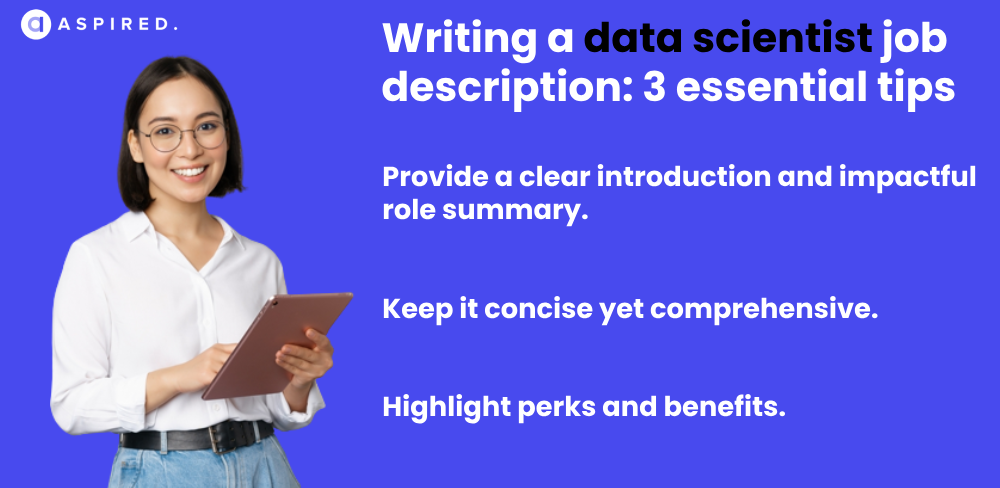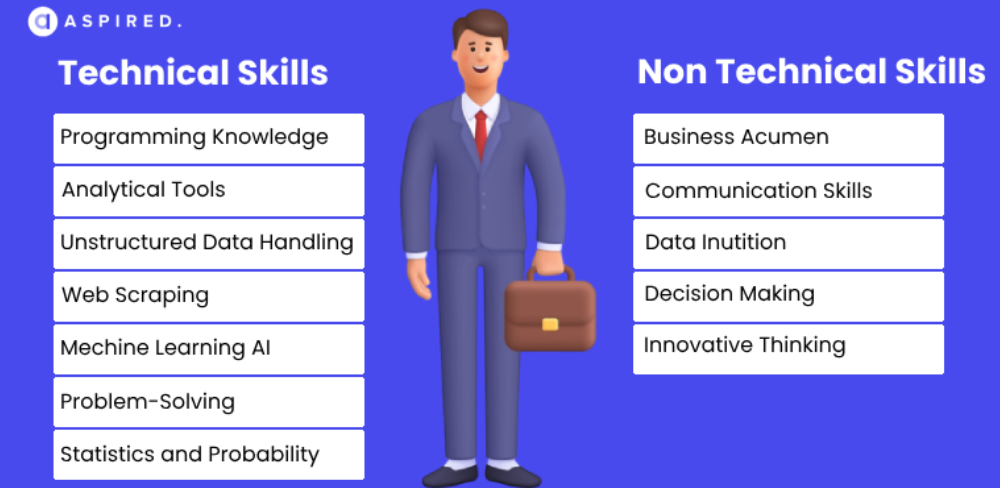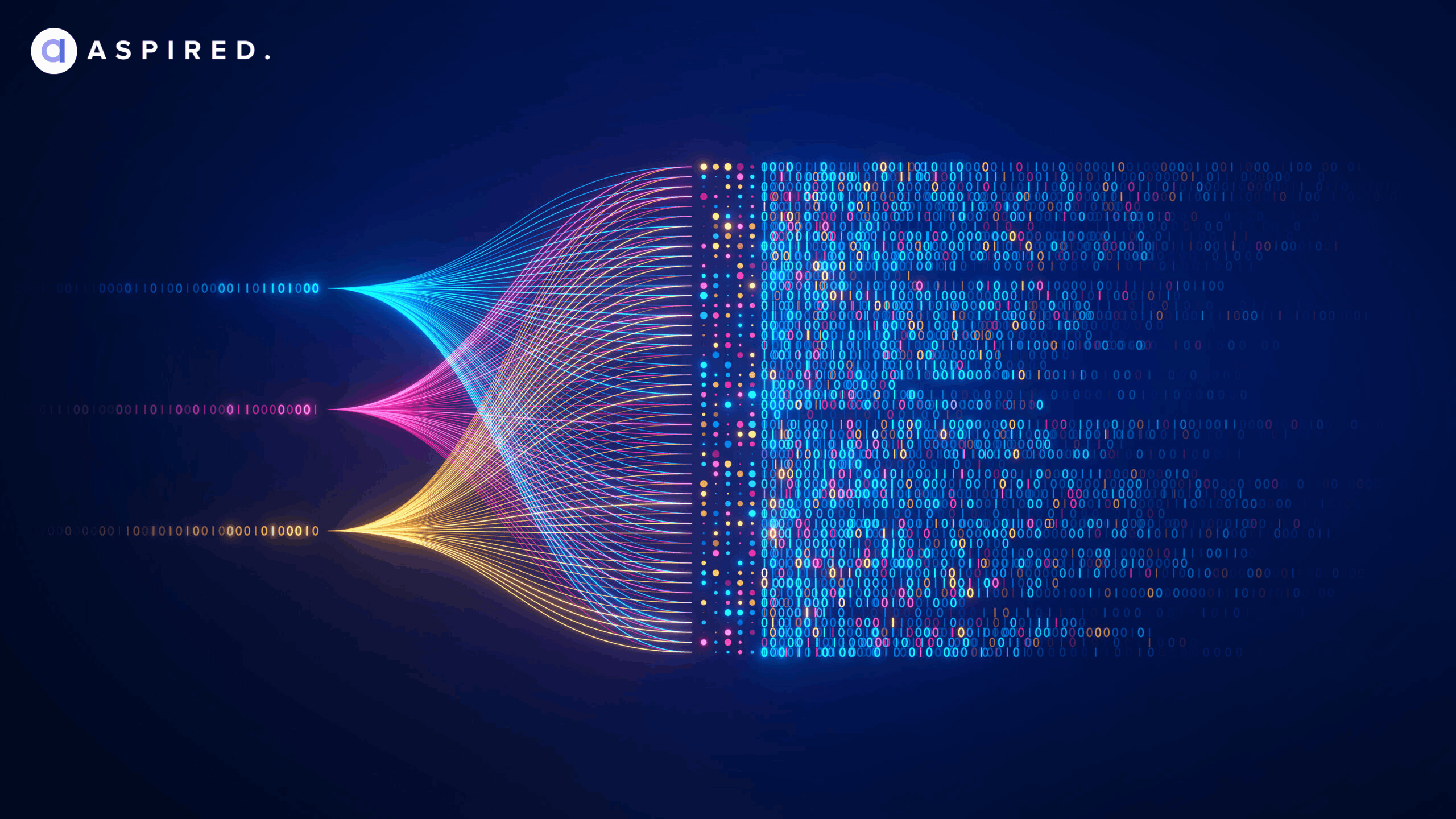Well, well, well... The demand for data scientists has surged with remarkable intensity. From a hiring rate of 30% in 2020, it leaped to an impressive 60% in 2021.
Is your organization, by chance, standing in the middle of the data jungle, looking to hire data scientists to pave a path? Then this blog post is your trusty map.
Here is a sneak peek into what we will cover if you are looking to hire a top-notch data scientist
- What do data scientists do?
- Crafting a data scientist role: top 3 guidelines
- Skill Evaluation: Checklist of essential technical skills required for data scientist
- Non Technical skill set requirements to vet data scientists
- Seven Essential questions to ask before you hire data scientists
- Hire top-notch data scientists Now!
What Does a Data Scientist Do?
In the age where “data is the new oil,” this question might be as basic as asking why the sky is blue, but let's dive in; who knows? You have been chilling with Fred Flintstone for the past decade, Yabba Dabba data 😉
Alright, jests aside, Here is the breakdown of what data scientists do
- Data management: They collect and tidy up massive volumes of structured and unstructured data.
- Analysis and Insights: With a blend of statistical tools and industry expertise, they decipher trends and patterns in the data.
- Problem-Solving: Beyond mere analysis, they offer strategic business solutions for intricate challenges.
How to Craft a Job Description for the Role of Data Scientist?
When it’s about driving your business forward, data scientists are invaluable. So here’s your cheat sheet to draft an engaging job description for them.

Make a Crystal Clear Introduction
- Begin with a concise overview of the role, emphasizing its significance.
- Avoid technical jargon; instead of deep diving into intricate algorithms, simplify with We seek data scientists to refine and interpret our data.
- Illustrate how the role aligns with and bolsters your organization's mission.
Make it Concise and Comprehensive
- As most candidates merely skim, keep the content concise.
- Try to strive for a job description length of 400 to 600 words. It's not just the word count but every word count.
Highlight the experience Perks and Benefits
- Engage potential hires by elaborating on both the monetary and non-monetary benefits they’d enjoy
- While perks might revolve around salary bonuses or cash rewards, benefits encompass non-cash compensation like health insurance, dental care, life coverage, vacation days, and retirement savings plans.
Evaluating Skills
Moving forward, let us discuss the required technical and non-technical skills in the data scientists you are hiring.

What Technical Skills You Should Look for Before You Hire a Data Scientist
Here is the checklist of all the essential technical skills you need in your data scientist
1. Programming Knowledge
Look for experience with Python, Java, SQL, C/C++, and Perl. Python is especially significant as it is widely used in data science for handling unstructured data.
2. Analytical Tools
Familiarity with tools such as SAS, Hadoop, Spark, Hive, Pig, and R indicates the candidate's ability to extract meaningful insights from data. Certifications in these tools can be an added advantage.
3. Unstructured Data Handling
A qualified data scientist should be comfortable working with data from various sources, including social media.
4. Web Scraping
Extracting data from websites is essential; proficiency in this skill can be beneficial.
5. Machine Learning and AI
Understanding deep learning with natural language processing and applying machine learning and artificial intelligence techniques is crucial.
6. Problem-Solving
Candidates should be able to evaluate complex problems and find practical solutions.
7. Statistics and Probability
A foundation in these areas helps make informed decisions based on data.
8. Advanced Mathematics
Multivariate calculus and linear algebra are necessary for data analysis and machine learning.
9. Database Management
Experience in organizing, storing, and accessing database data is fundamental.
10. Cloud Computing
Look for skills in managing and storing data and applications on remote servers.
11. DevOps Understanding
This skill ensures streamlined software development, focusing on collaboration between development and operations teams.
12. Data ETL
Extracting, transforming, and loading data are key steps before data analysis.
13. Neural Networks
It's a specialized skill where the candidate designs and refines neural networks for different applications.
14. Knowledge of Data Structures and Algorithms
Essential for efficient data storage, retrieval, and solving computational problems.
Remember, while technical skills are essential, soft skills and problem-solving capabilities are equally crucial in a data scientist.
What Non-Technical Skills Should You Spotlight When Hiring Data Scientists?
it's easy to get caught up in the technical jargon, the programming languages, and the algorithms. However, beneath the surface, a whole array of non-technical skills make a good data scientist great. So, before you hire data scientists, keep an eye out for the following non-technical skills.
1. Business Acumen
Here's a golden nugget. An impeccable data scientist isn't just a numbers person but someone who understands the intricacies of business. They can pinpoint problems and spy opportunities, driving your organization to new heights.
2. Innovative Thinking
We're talking about those light bulb moments! Being able to think outside the conventional box and come up with fresh, groundbreaking ideas.
3. Communication Skills
Technical proficiency is superb, but can they translate those data insights into plain English? A top-tier data scientist can effectively communicate their findings, even to those outside their tech bubble.
4. Data Intuition
Not all senses jump out at first glance. It's the Sherlock Holmes-esque intuition to see beyond the obvious to uncover hidden patterns in vast datasets. While it's a talent honed over time, look out for those who have taken the initiative to refine it, perhaps through boot camps or specific courses.
5. Critical Thinking
This is all about evaluating data with a discerning eye, questioning it, and arriving at well-thought-out conclusions.
6. Decision Making
With heaps of data comes the responsibility to choose the best action route. An adept data scientist weighs all the information and makes informed decisions.
Seven Essential Interview Questions to Spotlight Your Next Data Scientist
It's best to ask straightforward, direct questions for an effective interview before you hire data scientists for your organization. This way, you can easily judge and compare answers given by data scientist candidates.

Let's jump into seven straightforward questions for potential data scientists and what you should listen for:
1. Can you explain the difference between deep learning and machine learning?
Listen for: Machine learning likes organized data, and deep learning uses networks like our brain. Great answers also give examples, like self-driving cars or chat AIs.
2. How are supervised and unsupervised learning different?
Good answers will mention: Supervised learning uses known data for feedback, but unsupervised doesn’t. Top picks might also list a few popular algorithms for each type.
3. Which tools are essential for data scientists?
Here, good candidates will name tools they use a lot. Some might even say they prefer certain ones, mainly if your company uses them.
4. Which software is best for statistics, in your view?
Great answers will mention tools they like. But it’s even better if they say they're open to learning new ones.
5. Any downsides to top statistical tools?
This checks if they know their tools well. Can they talk about the weak points and how they'd handle them?
6. Which statistical software do you like the least?
Here, it's interesting to know what they avoid. But adaptability is vital. How would they deal if they had to use it?
7. Can you find good points in not-so-great software?
Top candidates can see both sides. Check if they can spot a few perks, even if it’s not their favorite. Remember, the best answers will be clear and show both knowledge and flexibility.
Hire Data Scientists with Aspired!
A top-tier data scientist does more than just juggle with numbers; they envision transformative strategies that can pivot your business to new heights.
Smooth sailing in the hiring? It's not a myth. With Aspired’s meticulously vetted and managed remote teams, you’re not just hiring expertise but ensuring brilliance. Harness the power of world-class data scientists without exhaustive research.
Connect with Aspired, and embark on a complimentary experience to redefine your data narrative.

 Clients
Clients
 Processes
Processes
 Blog
Blog










